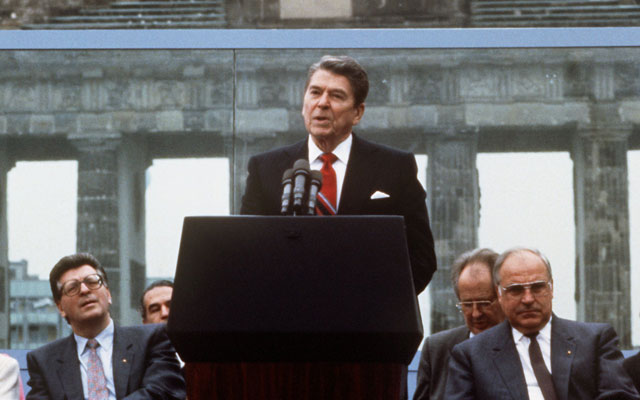
US President Ronald Reagan speaks in front of Brandenburg Gate in Berlin, June 12 1987 (Dieter Klar/picture-alliance / dpa/Newscom)
Today, we celebrate the anniversary of President Ronald Reagan’s great speech before the Brandenburg Gate in Berlin on June 12, 1987. Coming two and a half years before the end of the Cold War, Reagan’s famous line on the Berlin Wall still has that chill-giving power.
General Secretary Gorbachev, if you seek peace, if you seek prosperity for the Soviet Union and Eastern Europe, if you seek liberalization: Come here to this gate! Mr. Gorbachev, open this gate! Mr. Gorbachev, tear down this wall!
Reagan’s second visit to Berlin came after a decade of turbulent U.S. Soviet relations. There had been the confrontation over Soviet nuclear missile deployments in Europe. In Moscow, Mikhail Gorbachev had attempted to reform the collapsing Soviet system, releasing popular forces that would ultimately be beyond his control.
The totality of Reagan’s speech was characteristically visionary. By articulating what most people deemed impossible—the end of the Cold War—Reagan opened a vista to a different kind of world. He drew a contrast between a world of darkness and repression and a world of freedom and self-determination for hundreds of millions of people who had been trapped behind the barbed wire fences and concrete walls of the Soviet empire.
In fact, most of Reagan’s own foreign policy bureaucracy, at the State Department and the National Security Council, did not want the most famous line of the speech to be used, fearing it would anger the Soviets. Reagan speechwriter Peter Robinson had added it after talking to ordinary Berliners, who hoped the American President would demand an end to the Berlin Wall. Reagan, characteristically, liked it, but until the last moment, only he knew what he would actually say.
Before Reagan, on June 26, 1963, President John F. Kennedy had stated, “Ich bin ein Berliner” in a hugely popular display of solidarity with Germans. Like Kennedy, Reagan gave Berliners hope that they had not been forgotten by the West. It is very hard to imagine any politician taking such a public stand today.